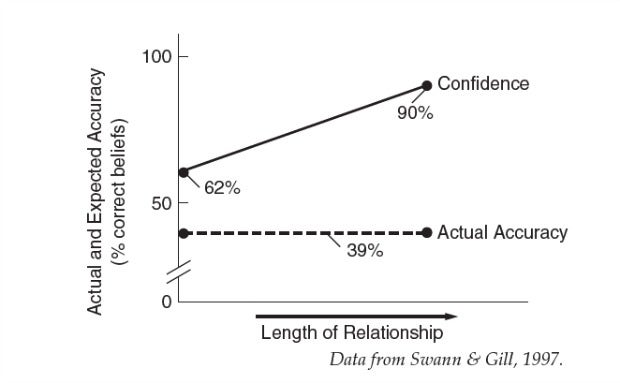6 Common Pieces Of Relationship Advice You Probably Never Knew Were Messing With Your Love Life — Bad
It's time to stop believing these harmful myths.
 Getty
Getty Success in finding happy, healthy relationships doesn’t only depend on your personality and compatibility with the other person.
As with everything in life, cognition — what we think and feel about people, events and experiences — has just as much influence when it comes to the ways of love.
It's not merely a cliché to say that our beliefs get in the way of clearly seeing the truth as it is.
Our beliefs, including limiting beliefs, provide a framework in which we shape our understanding of the world. Beliefs are shortcuts through which we can quickly imbue our lives with meaning.
And since humans are meaning-making creatures, it's no wonder we develop belief systems about literally everything — including romantic relationships, whether healthy or toxic.
The problem with some beliefs is that they may come from unreliable sources, such as personal experience, intuition, common sense, authority and tradition.
Culture, more specifically, pop culture, is an especially unreliable source for our beliefs. Its power is based on repetition and pervasiveness, so when our beliefs come from movies, magazines, or TV shows, they should be especially suspect.
Popular North American culture peddles certain beliefs as "relationship advice" that are actually known to be harmful.
These 6 pieces of common "relationship advice" are actually limiting beliefs that increase your risk of staying in unhappy, unhealthy and even toxic relationships.
1. Disagreements are bad.
According to this belief, disagreeing means that you and your partner aren’t compatible somehow. Some people even interpret disagreements as proof that their partner doesn’t love them enough.
Although love does come from a certain degree of similarity, disagreements happen. Whether it’s disagreeing over something small, like what to make for dinner, or something big, like whether to have children or not, no one can be expected to agree with another person 100 percent of the time.
I’m reminded of an episode of Black Mirror called “Nosedive."
In this episode, social media influence permeates our lives to the point where jobs, relationships, and even housing depend on how well you’re rated by others. Everyone wears pastel colors, everyone is insufferably polite and nice, and everyone is using everyone else to boost their own rating.
At the end of the episode, the main character ends up in prison, where nobody can rate her.
Agreeing all the time is a little bit like that over-nice, repressed society and it can affect our self-esteem to have to keep quiet all the time. Disagreements can be productive, even liberating. Disagreements remind us that we are all different people with different needs and different goals.
Disagreeing with your partner doesn’t mean you don’t love them; it just means that you are different. And working through disagreements can make relationships stronger, too: you learn more about each other, and you figure out how to live harmoniously despite being different.
2. Your partner should be able to read your mind.
I used to get into that one all the time with my ex. Somehow, I was supposed to understand what he thought and how he felt without him telling me anything about it. When I asked him about his feelings or his needs, he would sometimes tell me: “we’ve been together long enough; you should know!”
Well, sorry mister, but I’m not a mind reader.
I have to admit that I expected this of him as well. Somehow, I believed that he could guess my state of mind. (Although he was pretty observant and a good judge of what others are feeling/thinking, it still isn’t okay.) This belief turned catastrophic for our relationship.
Somehow, people in relationships think that they know their partners better over time, which leads to some laziness about communication.
In a famous study by Swann & Gill (1997), people in relationships were asked to answer questions about their partners. The longer they were in the relationship, the more confident they felt about the accuracy of their answers.
However, their accuracy wasn't always so accurate. In truth, they were accurate only 40 percent of the time. But as they grew more familiar with each other, people confidently believed that their accuracy improved by nearly 100 percent.

Basically, we don’t know other people well, but we think we do.
Does mind-reading still seem like a reasonable expectation to you? It seems even more ridiculous after seeing this data.
3. People don't change.
Many people believe that their partners don’t or won't change.
We complain, “You’re not the person I married/fell in love with."
But why would they be? People change — all the time. Even at a biological level, the cells in our bodies are replaced again and again over time.
There’s a process in psychology called attribution bias, defined as, "a cognitive bias that refers to the systematic errors made when people evaluate or try to find reasons for their own and others' behaviors."
One example of this is how we tend to believe that our own good traits and deeds are based on stable, unchanging characteristics.
When you do something nice, you think, “I’m a good person!”
This process also makes us believe that our own bad traits and deeds are based on contextual, temporary characteristics. For example, if you act in anger or do something wrong, you tend to put the blame on circumstances rather than your own traits.
Coming home one evening feeling cranky, you snap at your partner for something insignificant. When your partner raises the problem, you put the blame on a bad day at work rather than on you being a bad or mean person.
Interestingly, we tend to do the opposite in regard to other people. We attribute their good deeds to context, and we attribute their bad deeds to unchanging traits.
So, when it comes to the belief that people don’t change, we arguably would apply this belief to their flaws rather than their good side. A partner who cheats is dishonest and unfaithful; a partner who spoils us is in a good mood.
In reality, much of our behavior is actually of the contextual kind. We have tendencies based on our personalities, but we are able to act differently in different circumstances. So if we acknowledge this about ourselves, why do we have trouble acknowledging it in others?
That’s a question for better psychologists than me, but it should make you reflect on how you interpret your partner’s behavior. Maybe they just had a bad day, too?
4. Sex should be mind-blowing every single time.
This belief happens at the intersection of porn culture and Hollywood romanticism, and it’s super harmful. Related beliefs include: “We should always want and be ready for sex” and “Sex will always be good if we really love each other."
As you can guess, I’m not a big fan of romantic comedies, but there’s one scene I like in the movie About Time, where the main character travels back in time three times to have better and better and better sex with the same woman each time.
Here’s a video of the director explaining the scene:
I like this scene because it admits that sex with a new partner can be just meh. It takes the main character three times to get it right.
In real life, it usually takes more than three times, but you get the point. And I’m sure you can think of similar instances in your life, where sex was just meh, even though you loved the person very much.
Thing is, sex is a kind of performance. It requires commitment and connection, sure, but also requires skill and knowledge.
Loving your partner isn’t enough to be good in the sack, though. I’m pretty sure you wouldn’t nail a role in Hamlet right off the bat without a little practice first, no matter how much you love the play. So why do we have this expectation about sex?
Sex can suck. Sometimes you mess up a recipe. Not every painting is worth hanging on a wall. Not every story is worth publishing.
Not every sex session is going to be amazing. Don't let jaded relationship advice from people who don't fully understand sexual relationships tell you otherwise.
5. Men and women are inherently different.
Okay, sure, men and women are different in some ways. But in general, on any given measure, research shows that the differences between genders are smaller than the differences between individuals of the same gender.
From this belief comes the limiting belief that men and women can’t understand each other — that their needs, desires and goals are so dissimilar that we need to spend our lives trying to figure out what the other wants, mistakenly thinking that once we know, we will hold some kind of secret formula.
Thing is, people are not their gender.
Every person is different, with different goals, needs, and interests. If you want to know what someone wants, ask them.
6. Good relationships don't need work.
This false belief is somewhat related to the first one.
If you think that disagreements are bad, then you think that relationships don’t need work. The thing is, every relationship needs work. Sometimes people mess up.
Sometimes people change. Sometimes life changes and forces us to deal with new situations.
In my experience, the best relationships are those where people work at it all the time.
They are constantly paying attention to the other. They check in all the time. They understand that people change, that life changes, that nothing is constant or eternal — especially not relationships.
Good relationships don’t just happen. Good relationships are the product of work and commitment and compassion. Good relationships are not destined: they are made.
Common Denominator: The Fixed Mindset
What all these beliefs have in common is the idea that things are somehow destined, fixed, that people don’t change and that relationships are meant to be (or not).
And that simply is not true.
Anabelle Bernard Fournier is a sexuality, relationship, kink and polyamory writer with a bent for science and psychology. For more, follow her on Twitter.

